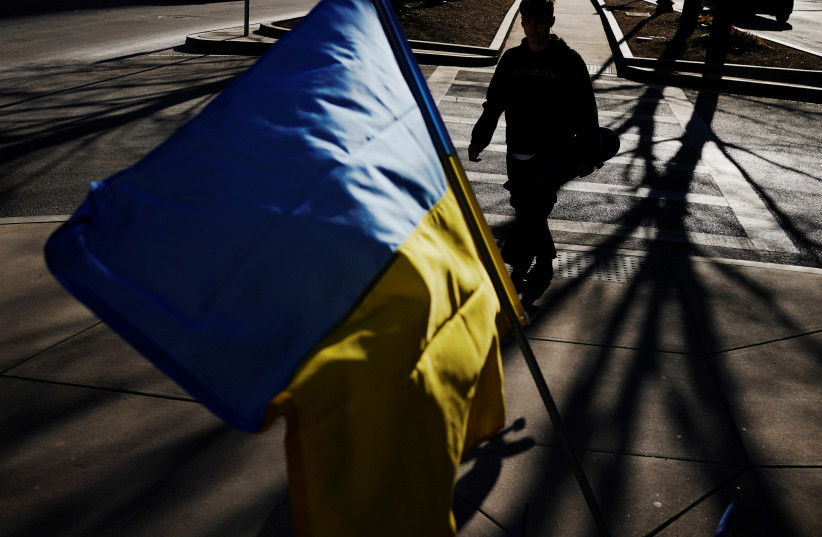GROTON, Massachusetts – Driving outside of Providence, Rhode Island, the interconnecting highways and bridges give way to pretty fields and modest homes. Interspersed along the side of Interstate 95 as it heads west is a large sign next to an auto dealer that was clearly designed to be just high enough for the drivers to see.
“Stop Putin,” it reads in red letters. It’s not the only sign condemning the Russian invasion of Ukraine on display across small towns in New England. Also noticeable are Ukrainian flags and and other symbols of support for the Ukrainian resistance.
During a trip from Maine to Connecticut, I saw widespread backing of Ukraine. This meshes well with the sense that the West was shocked by the Russian invasion in February. Now, two months later, there is widespread support for the Ukrainians across parts of the United States, and throughout the West in general.
The presidents of Poland, Estonia, Latvia and Lithuania are all heading for Ukraine this week or offering other signs of solidarity with the besieged country, according to media reports. UK Prime Minister Boris Johnson was recently in Kyiv. And US President Joe Biden this week accused Russia of genocide and promised more funding for weapons for Ukraine.
However, some critics in the West have slammed the US approach as “escalation” and have claimed that Russia was provoked into war. Some of these critics, posing as “realists” in articles in online media, have claimed that support for Ukraine is some kind of media-driven madness, akin to how the West approached the COVID pandemic. According to this line of thought, backing Ukraine is an “elite” drive for conflict with Russia.

The critics appear to be wrong, at least when it comes to how small downs up and down the northeast coast of the United States feel about the war. Ukrainian flags adorn homes. Even churches have put up signs saying they stand with Ukraine. The support can be seen in small towns like Sullivan, Maine, and Groton, Massachusetts. In Groton, next to a historic inn that dates from the 17th century, two of the stately white homes are flying Ukrainian flags.
The flags are poignant against the storied histories of these areas. In nearby New Hampshire the license plates say “Live Free or Die.” This sentiment comes from the era of the American Revolutionary War. Channeling that sense of a right to resist powerful empires is a sense that Ukraine embodies a will similar to those Americans who threw off the bonds of their British overlords in 1775.
IT IS NO coincidence that Concord, Massachusetts — where American militia drove off a British raiding column in April 1775 — has adopted the Ukrainian cause. Ukrainian flags and placards posted in front yards are common.
“Concord for Ukraine,” read the signs, along with a website address where people can donate to the cause. This presence of the blue and yellow flag of Ukraine is ubiquitous.
We drove from Concord toward Boston, following the route of the battles of Lexington and Concord. It was along this road that British troops dispatched from Boston in the pre-dawn hours encountered resistance from militias. They were then harried by the American revolutionaries as they retreated back to Boston.
The Russians are being similarly harried, it appears, forced back from Kyiv and forced to rethink their strategy. Like a hammer, the Russians appear poised to strike at the Donbas region now, an area of conflict that their masses of soldiers and armor had avoided so far. Time will tell if Western support can keep the Russians at bay.
For Americans who have concerns that the conflict in Ukraine might lead to escalation and a wider war, drawing in NATO or US troops, those same concerns can also be seen across New England. In Pepperell, up the street from Groton, there is a pretty memorial for veterans of foreign wars. Bricks surround a large granite monument. The bricks have names of veterans from various wars, going back to the Revolution.
The monument includes a six-foot cut-out image of an American soldier and the outline of Afghanistan and Iraq. The fallen from small towns like Pepperell have seen action and sacrifice for hundreds of years in America’s wars.
For many towns here, it is the Civil War that looms largest, especially in Maine. But the current war abroad has also prompted many young men to go off to fight. Some of those men now support Ukraine. And some have volunteered their expertise to back the Ukrainians against the Russian invader.
This widespread sentiment cuts across political divides. Even those on the Right who back former president Donald Trump, and are aware of the criticism of getting involved in the war in Ukraine, know in their heart that Russia is wrong.
